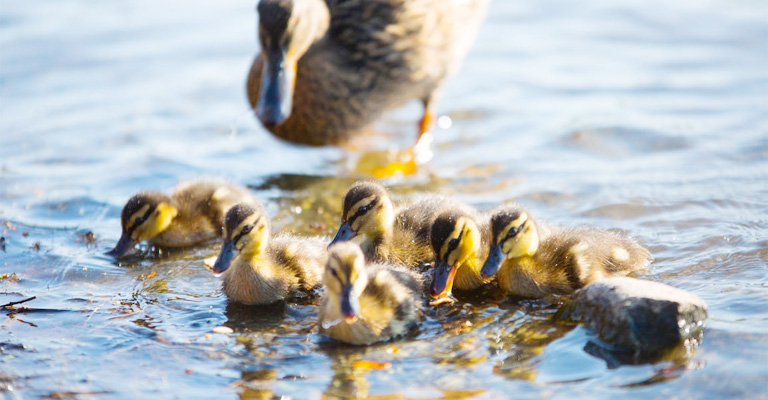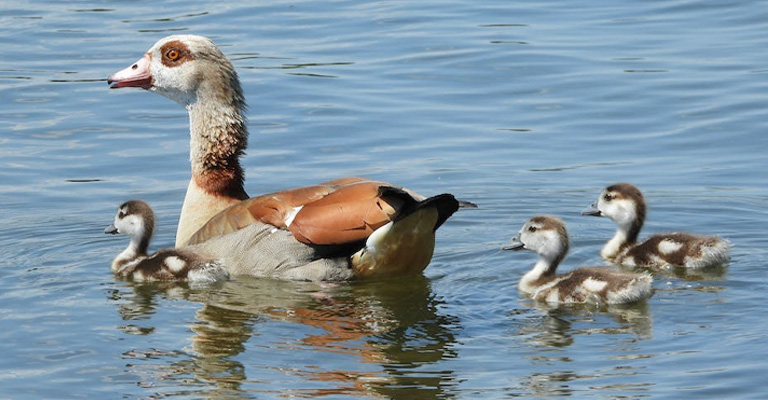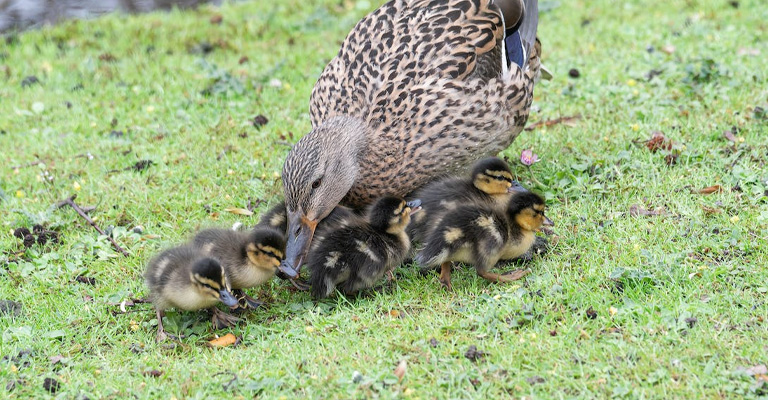The nurturing behaviors of mother ducks are a testament to the remarkable ways in which the natural world fosters life.
Among these endearing acts of maternal care, the process of how does a mother duck feed her ducklings is a fascinating insight into avian parenting.
Ducks are well-known for their close-knit family units, and a mother duck’s role in feeding her ducklings is crucial to their survival and development.
This intricate process involves introducing the young ducklings to a diverse array of foods, each with specific nutritional benefits.
From foraging for aquatic insects to teaching them to recognize edible plants and small aquatic prey, mother ducks provide their offspring with the foundation they need to thrive in their watery habitats.

How Does A Mother Duck Feed Her Ducklings?
Mother ducks employ several nurturing methods to feed and care for their ducklings. Here are the ways a mother duck ensures her ducklings are well-fed:
Dipping for Aquatic Food
Mother ducks often lead their ducklings to the water, where they teach them to forage for aquatic insects, small fish, and water plants. The mother demonstrates how to dip their heads and necks underwater to search for food, and the ducklings mimic her actions.
Supplemental Feeding
In addition to aquatic foraging, mother ducks may lead their ducklings to forage on land. They find seeds, grains, and small invertebrates in grassy areas, providing a diverse diet for their young.
Regurgitation
Mother ducks have specialized digestive systems that allow them to eat a wide range of foods. They can partially digest food and regurgitate it to feed their ducklings.
This method is essential during the first few days of a duckling’s life when they require easily digestible nutrients.
Protection During Feeding
Mother ducks are vigilant protectors of their ducklings. While feeding, they keep a watchful eye out for potential predators, ensuring their young are safe as they search for food.
Teaching Foraging Techniques
Mother ducks teach their ducklings how to find food by guiding them and demonstrating foraging techniques. This includes pecking at the ground, turning over leaves, or using their bills to dislodge insects.
Leading to Food Sources
Mother ducks lead their ducklings to areas with abundant food resources, such as ponds, lakes, or wetlands. They guide them to the best locations for feeding and teach them where to find nourishing meals.
Providing Shelter and Security
Ducklings are vulnerable to predators, so mother ducks also ensure their safety as a form of indirect feeding. By protecting them from harm, she allows them to focus on foraging and growing without the constant threat of danger.
Mother ducks play a crucial role in ensuring the nutritional well-being of their ducklings through these various feeding and care strategies, setting them on a path to develop into healthy and independent waterfowl.
How Long Does A Mother Duck Feed Her Ducklings?

The feeding habits of mother ducks evolve as their ducklings grow, ensuring that the young birds receive appropriate nourishment at each stage of development.
Here are the duckling age phases of how long a mother duck typically feeds her ducklings during each phase:
Newborn Phase (0-2 weeks)
During the newborn phase, ducklings rely entirely on their mother for nourishment. The mother provides them with regurgitated food, offering easily digestible nutrients. This phase lasts for the first two weeks of the ducklings’ lives.
Transition to Solid Food (2-4 weeks)
As ducklings grow, their mother gradually introduces them to solid food while still providing regurgitated meals. She encourages them to forage for insects, small fish, and aquatic plants, teaching them essential foraging skills. This transition phase lasts from 2 to 4 weeks.
Independent foraging (4-6 weeks)
Ducklings become more independent in finding food between 4 to 6 weeks of age. While the mother continues to offer guidance and protection, the ducklings are proficient at foraging for themselves, both in water and on land.
The mother’s role becomes less direct as the ducklings gain confidence in their foraging abilities.
Advanced foraging (6-10 weeks)
By 6 to 10 weeks, ducklings have honed their foraging skills further. They explore a wider variety of food sources and become adept at catching insects and small prey.
The mother duck remains nearby, providing oversight and protection as needed.
Weaning Phase (10-12 weeks)
Around 10 to 12 weeks, ducklings gradually wean off their dependence on their mother’s guidance and protection. They continue to forage independently and rely less on their mother’s presence for safety, signaling the end of their primary feeding period under her care.
Juvenile stage (12-16 weeks)
Ducklings enter the juvenile stage between 12 to 16 weeks, where they continue to refine their foraging skills and become more self-reliant. They fully transition to an adult diet and behavior, no longer relying on their mother for guidance in finding food.
Maturation into adulthood (16+ weeks)
Beyond 16 weeks, ducklings have matured into adult ducks, capable of fully independent foraging. They have learned essential survival skills from their mother during their formative stages and are now well-equipped to fend for themselves in their natural habitat.
During these phases, a mother duck gradually reduces her direct involvement in feeding as her ducklings become more self-sufficient.
By guiding them through these critical developmental stages, she ensures their successful transition into independent adulthood.
What Does A Mother Duck Feed Her Ducklings?

Here’s what does a mother duck feed her ducklings:
Insects and Larvae
Mother ducks feed their ducklings various insects and larvae, including ants, flies, caterpillars, and dragonfly nymphs. These protein-rich foods are essential for the ducklings’ growth and development, providing vital amino acids.
Aquatic Plants
Aquatic plants like water lilies, duckweed, and algae are part of a duckling’s diet. Mother ducks teach their ducklings to recognize these plants, which are not only a source of nutrition but also aid in digestion and provide essential fiber.
Small Fish and Fish Fry
In habitats with accessible water bodies, mother ducks introduce their ducklings to small fish and fish fry. These aquatic creatures are rich in protein and contribute to the ducklings’ overall nutritional intake.
Grains and Seeds
Ducklings are introduced to grains and seeds such as wheat, barley, and millet. These foods provide carbohydrates and energy, helping the ducklings maintain their activity levels and supporting their rapid growth.
Crustaceans
Crustaceans like small crabs, crayfish, and shrimp are an important part of a duckling’s diet. These marine creatures offer essential minerals and proteins, aiding in bone development and overall health.
Earthworms
Mother ducks feed their ducklings earthworms, which are highly nutritious and easy to digest. Earthworms provide an excellent source of protein and are readily available in many habitats.
Small Mollusks
Ducklings are introduced to small mollusks like snails and freshwater mussels. These creatures offer a source of calcium, which is vital for bone development, especially in growing ducklings.
Aquatic Vegetation
Apart from insects and small prey, ducklings consume aquatic vegetation such as pondweed and water milfoil. These plants provide additional fiber and nutrients, contributing to a balanced diet.
Berries and Fruits
While not a primary food source, some duck species, particularly in terrestrial habitats, introduce their ducklings to berries and fruits. Berries like blueberries and strawberries provide antioxidants and vitamins, enhancing the overall nutritional diversity of the ducklings’ diet.
Mother ducks meticulously introduce their ducklings to this varied diet, ensuring they receive a balanced and nutritious range of foods that support their growth, development, and overall health.
This diverse diet is crucial in preparing them for adulthood in their respective habitats.
FAQs
How do mother ducks feed their ducklings?
Mother ducks feed their ducklings by introducing them to a variety of foods in their environment. This includes aquatic insects, small fish, crustaceans, and aquatic vegetation.
They teach their ducklings essential foraging skills, guiding them to find and consume the right foods.
What is the role of regurgitation in feeding ducklings?
Regurgitation is a method by which mother ducks feed their ducklings during the early stages of life. They partially digest food and then regurgitate it, offering pre-digested meals to their young.
This allows ducklings to access easily digestible nutrients, an essential part of their early diet.
How do mother ducks ensure their ducklings receive a balanced diet?
Mother ducks ensure a balanced diet for their ducklings by exposing them to a wide range of foods.
They lead their ducklings to different habitats, such as water bodies, to introduce them to various food sources, including insects, plants, small prey, and grains. This diversity in food types contributes to a well-rounded diet.
When do ducklings become independent in finding food?
Ducklings gradually become more independent in finding food between 4 to 6 weeks of age. Their mother’s guidance and protection remain essential during this transition phase. By 10 to 12 weeks, ducklings are largely self-reliant in finding their own food.
Do all duck species feed their ducklings in the same way?
While the basic principles of mother duck feeding apply to most duck species, the specific foods and feeding techniques can vary depending on the species and their habitat.
Different species may introduce their ducklings to unique food sources that are prevalent in their specific environments.
Conclusion
The journey of how a mother duck feeds her ducklings is a heartwarming illustration of the enduring bond between a parent and her young.
Through a diverse diet that includes insects, aquatic plants, small prey, and grains, mother ducks equip their ducklings with the skills and nutrition necessary for growth and vitality.
This nurturing process encompasses not only the transfer of essential nutrients but also the transmission of life skills and knowledge. As ducklings develop into independent juveniles, they carry forward the lessons learned from their mothers, ensuring the continuation of duck populations.
The diligence and care with which mother ducks feed and guide their offspring underscore the intricate balance of nature and the profound role of maternal love in the animal kingdom.